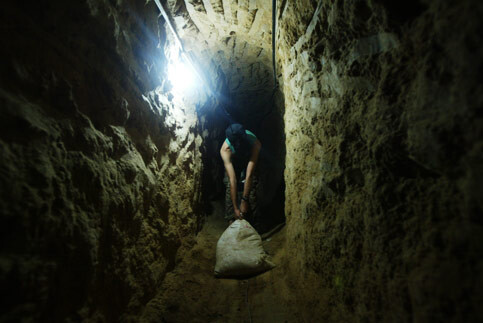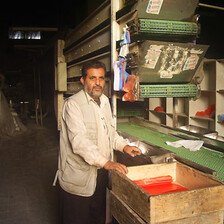Gaza Strip 24 October 2008

The tunnel trade in Gaza has become one of the only ways for Palestinians to get essential goods into the besieged territory. (Iyad Albaba)
Since Israel’s total closure of Gaza began over 16 months ago, the Palestinian residents of the tiny coastal strip have relied on smuggling to meet their basic subsistence needs. A recent United Nations report stated that Gaza’s local market is beholden to the tunnel trade or “death trade,” which has so far claimed the lives of 40 people. Known locally as “grave diggers,” a few thousand men earn their living by digging tunnels where they transport essential goods from Egypt like food, cooking gas, petrol, live stock and even electric devices.
The tunnels are all closely lined up along the Philadelphia route on the Gaza-Egypt border. Gaza’s markets are now filled with either Egyptian-made or Egyptian-imported goods. This is particularly true in the city of Rafah, in the southern Gaza Strip, where the tunnel trade is concentrated.
“I feel comfortable finding something to sell rather than finding nothing, but I am not satisfied with myself as a merchant, depending on smuggled goods. The prices are relatively high, while the people’s purchasing power is considerably low. Can you imagine, you must buy smuggled clothes for your children! It’s America, Israel, and some Arabs who have forced an entire people to rely on smuggling,” Abu Jamal, a 43-year-old merchant of electric devices explained.
In the early morning hours on Tuesday, Abu Yasser, a tunnel worker transporting cooking oil, shared Abu Jamal’s sentiments, adding, “let Israel besiege us the way it wants, but we are here bringing what we want, also. At least we can now make bread, and we can cook, despite relatively high prices.”
While placing gas canisters inside a van in front of his tunnel’s tent, Abu Yasser explained that “Every day, we transport about 300 to 400 gas canisters from inside the Egyptian territories, with the help of some Egyptian brothers at the Egyptian side of this border. However, each canister costs 100 US dollars, it is still much better than lacking them totally.”
While Abu Yaser’s tunnel is active, others, like that of Abu Hassan, are still under construction. Digging a tunnel requires three to four months; Abu Hassan and other workers use an electric machine to pull out piles of sand from a hole that is 21-meters deep. A father of seven children, Abu Hassan explains that “what pushed me to work in these tunnels is the fact that over the past 16 months, I have been staying idle without job. How could I feed my family? I know it is dangerous work, but what can I do? I have no other option.”
In the past several months, scores of tunnel workers have died, either while digging or because of Egyptian authorities collapsed some of these tunnels. However, the trade continues unabated, driven by Israel’s ongoing blockade.
Abu Mohammad, a resident of Khan Younis, has worked as a tunnel contractor for the past eight years. Last summer his brother and nephew were killed while digging a tunnel. “After the death of my brother, Helmi, and nephew, I have felt so depressed and even sick. But what can I say, suppose I stop working, how could these people live, how? Many are staying idle without work and believe me, if you come in the afternoon, you can see how many are looking for work digging there!”
Recently, the Hamas-led government in Gaza has imposed new regulations and restrictions on the tunnel trade to avoid more deaths and to prevent the smuggling of drugs and prohibited substances to the Gaza Strip. However, the besieged Hamas government can not guarantee an end to the tunnel trade, unless the Israeli blockade comes to a halt.
“The repressive Israeli siege of Gaza has led the steadfast Palestinian people to think of creative means to sustain a living. We have been trying to organize movement at the border lines with Egypt, like giving instructions and monitoring goods coming in the Strip. I can say that this is an exceptional situation that can come to an end, if the Israeli blockade on the region is lifted completely,” commented Ehab al-Ghosain, spokesperson of the Interior Ministry.
Israel began enforcing the siege after Hamas seized power in Gaza amidst factional fighting with the Palestinian Authority President Mahmoud Abbas’s Fatah party. The Jewish state claims that the Gaza tunnels are used to smuggle weapons from Egypt to Gaza-based Palestinian resistance factions. It also blames the Egyptian authorities for not shutting down these tunnels. In June, Israel and the Palestinian factions agreed to an Egyptian-brokered ceasefire. Under the terms of the ceasefire, Israel was supposed to lift the Gaza blockade gradually, but it has not done so. The UN has called for reopening official crossings between Gaza and Israel, including the Rafah crossing terminal in southern Gaza, which has been closed by Egypt in June 2007.
In spite of widespread deprivation because of Israel’s siege, Abu Yasser remained defiant, stating as he loaded the cooking oil canisters, “Let Israel besieges us the way it wants, and we bring in what we want. At the end of the day, we will not let anyone repress us.”
Rami Almeghari is contributor to The Electronic Intifada, IMEMC.org and Free Speech Radio News. Rami is also a former senior English translator at and editor-in-chief of the international press center of the Gaza-based Palestinian Information Service. He can be contacted at rami_almeghari A T hotmail D O T com.
Related Links





